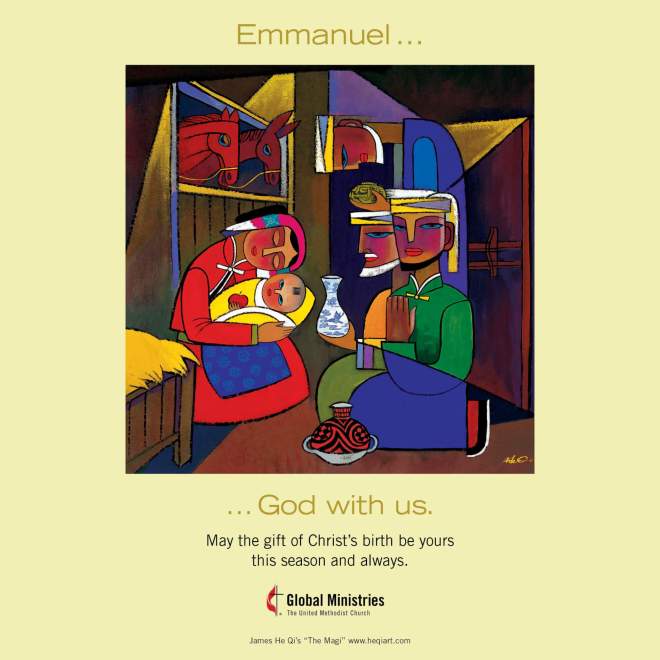
By Thomas Kemper
December 20, 2019 | ATLANTA
Christmas, the celebration of the birth of Jesus, is a time of joy and celebration. But, no matter the year, it takes place in a real world where everything is not glorious or cheerful. It is a juxtaposition made clear in the nativity scene of Claremont United Methodist Church in California, where members of the Holy Family are separated — in cages. A few years ago, the massacre at Sandy Hook Elementary School in Newtown, Connecticut happened the day before our Christmas celebration at Global Ministries. And this year, on the morning of our Christmas service and luncheon, we received news of the untimely death of one of our former young adult missionaries. Tawanda Chandiwana, 29, was jailed in the Philippines last year for standing up for human rights. His death was likely preventable, related to a doctors’ strike in Zimbabwe.
Jesus was born into two overlapping worlds in ancient Judea – one Roman, one Jewish. The second chapter of the Gospel of Luke paints the picture, and the commentary of the late German theologian Rudolf Pesch has liberated the depth of this marvelous passage for me. We must consider Luke 2:1-21 in full. This means including in our Christmas reading verse 21, a verse omitted from virtually all lectionaries.

Luke 2 begins, “In the days of Caesar Augustus…”. Jesus was born into a political and social world that belonged to Augustus, the first of the Roman emperors. After defeating his opponents, Augustus established by force the Pax Romana — “the Roman peace” — over a vast territory of differing peoples. While credited with being a great administrator, Augustus allowed conquered people only limited self-expression and insisted they accept his will. But why? And at what cost? “That all the world would be registered…”. Some translations say “taxed.” Since Caesar had to pay the legionnaires who enforced the peace, everyone was taxed, even the poor and enslaved.
Jesus was born into a world of Roman brutality and oppression. We don’t know the economic status of Joseph the Galilean carpenter, but it couldn’t have been high. He and pregnant Mary likely walked 90 miles from Nazareth to Bethlehem to be counted — and taxed. The exhausted couple was shut out of the inn, maybe because they did not have money to rent a room. And it was in a manger, an animal feeding trough, where their newborn baby was laid. What an expression of the real world! The lowly shepherds, some among them likely thieves and scoundrels, also represent the real world. We learn they were alerted to the coming of a savior by God’s angelic messengers. They were the first to hear the good news that peace would not belong to Caesar but to all people.
Luke chapter 2, as read on Christmas Eve and as cited in every lectionary I have found, ends with verse 20, with the shepherds returning to their fields praising God. But it is verse 21 that underscores the reality of the familial and religious worlds into which Jesus was born. The verse reads:
After eight days had passed, it was time to circumcise the child; and he was called Jesus, the name given by the angel before he was conceived in the womb.
Jesus was a Jewish male child! With this important verse omitted from the Christmas story, we lose sight of Jesus’ lineage and his birth into a Jewish family in a real community defined by Roman rules and a tax policy enforced by the military. He and his family shared the oppression of the Pax Romana. He was among the victimized people. Verse 21 locates Jesus in Jewish religious history while at the same time extending the narrative of God’s steadfast love and faithfulness.
Jesus is born each Christmas into a real world where there is no home for too many children, where warm welcomes are few, and where God’s people are called to care for those seeking refuge in new lands.
Jesus is born each year into a real world where marginalized people, like the shepherds, recognize the savior, while organized religion stumbles to address the needs of the most vulnerable.
Jesus is born each Christmas into a real world of poverty, hunger and homelessness that can only be addressed with mangers of care, compassion and generosity.
To more deeply explore the reality of Christmas in the real world, I invite you to read the opening and closing prayer from our Christmas gathering written by two staff members at Global Ministries.
Our joy, our work, at Christmas is to celebrate Jesus, our savior and Lord, despite the brutality and despair of the real world.
Be strong. Do not fear. God is here. God is with us. Emmanuel.
Thomas Kemper is the general secretary of the General Board of Global Ministries of The United Methodist Church.

